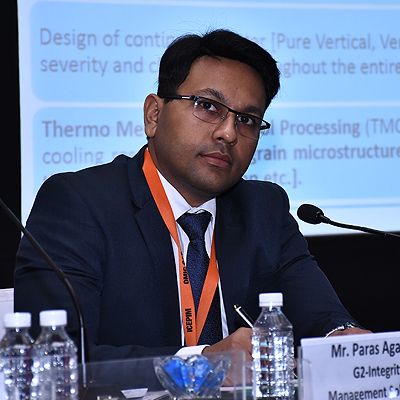

Gaurav Bhende
M Tech, Chartered Engg.
Who should read: Mechanical engineers, Piping / pipeline stress engineers / FEA engineers. Hello friends, my name is Gaurav Bhende and I am the founder of PROTTON SYNERGY (formerly known as PROTTON ENGINEERING).
Being a hard-core stress engineer, I have been into consultancy services for almost two decades. I have also been writing white papers, conducting Training seminars on Pipe Stress Analysis on induvial and corporate level for more than a decade now. On attending my seminars or lectures a common feedback I get, ‘How do you make the difficult stress concepts so easy to understand?’ And many who get inspired to train other engineers think that I have some ‘secret recipe’. And today I am going to share my secret recipe of my limited success. Let’s begin.
Forget that ‘I am an Engineer’ / Shoes and ego should be kept outside
This is the first advise I give it to my students / employees, ‘Forget that you are an engineer’. Most of the engineers cannot think how to approach a problem because they try to co-relate it with the theory they leant in the Universities and then the probability of the answer depends of how much they have memorized it, Instead if you approach the problem with ‘lay-man perspective’ and keeping your ‘basic instincts alive’ the chances of getting answer is more. Use ‘common sense’ (which is very uncommon). The ‘ego’ of ‘being an engineer’ kills your freedom to ask questions ….to yourself as well.
Experience the stress concepts by co-relating it with your body
I strongly believe that Human Body is the best engineered structure ever made. Example: What is bending moment? Answer: Hold a water filled bottle in your hand and keep hand straight from shoulder, parallel to floor. What you experience after couple of minutes is ‘Bending Moment’. So, what is the solution? Either give support from other hand or fold the hand through elbow, means reduce the bending arm.
Thus, you get some hint how to approach your problem.
Go back to school, buy books, don’t refer internet
If you want to become a good stress engineer then your school level mathematics and physics must be on your fingertips. Memorize the formulae, memorize the tables (typical Indian style). Most of us might have thought while pursuing the engineering degree that the syllabus we learned was not relevant to the real industry practices, it was obsolete. There is nothing beyond basics. If you are not clear with concepts of displacement, strain, stress, modulus of elasticity, Poisson’s ratio, Moment of Inertia then go back and buy books. Internet search will not tell you what you should read first. It gives direct answers whereas books are like story narrated where author talks to you and you get the flow & logic.
Make your ‘WHY’ clear
That is what I do in my training sessions. I try to make concepts clear relating them with day to day stuff. Once your ‘WHY’ is clear ‘HOW’ becomes easy. Then you are at ease and as comfortable as how you are when going to your hometown. You enjoy the journey as your are certain about the path you are walking on. Most importantly you know the means to reach and the destination well.
Take more Responsibility, as if you alone need to solve the problem
Most of the engineers ‘give up’ early. They do not ‘Dive deep’ into it. Rather rely on senior assuming he/she would solve it and being junior my work is just to assist. Wrong approach. Do not believe that ‘More years of experience means more knowledge’. Beware of the fact that ‘today’s armature will be known as tomorrow’s expert’ and you will be on the other side of the table. The power of your brain is unimaginable and unstoppable despite you have scored average marks. Believe and use it.
Do not copy success of others, try to copy their efforts
Success is relative. It not only means where you have reached but also where you have started from and what path you chose. Luck is the combination of ‘Preparedness’ and ‘alertness’ when the opportunity is passing by. If you are not prepared then ‘opportunity’ would be wasted and preparation takes time. Hence, those you think ‘lucky’ are more ‘disciplined’, ‘diligent’ and ‘Hard working’. Copy their hard work, not the success. Be persistent and patient till you succeed. You will.
Select good Senior and do not run behind the big companies
In first 5 years of your career you should look at your immediate senior or manager and not what facilities are provided by company or what is its brand value. Bigger the company, lesser the responsibilities and lesser the learnings. It is believed that if you want to earn wisdom / knowledge equal to your Guru (the one enlightens you and not only teaches you), you should be with him for twelve year. Forget 12 years, at least be with your good senior and company for three years. It takes time to learn. You must know that you do not know many things yet.
When I showed this blog to my mentor Mr. Sharad Ashtikar, he added “consider engineering as a passion. Every engineer has analytical mind and engineering common sense. We do not use or apply it. Try to approach any concept or a problem with open mind and with engineering common sense keeping the fear factor and ego away. Learn from past (active experience) and learn from others (passive experience). These learning are not to be forgotten but to be kept alive in brain. At the end ‘share what you have learnt’.
These are the principles which I followed and open secrets of my limited success!!!
I acknowledge Mrs. Prachee Mahambare, Director of iprofex, for her help in editing this blog.
2 responses on "Do you want to become a Technically Sound Pipe Stress engineer?"
Leave a Message Cancel reply
Your email address will not be published. Required fields are marked *


Hello Sir,
I would like to take training on Technically Sound Pipe Stress engineer via online.Could you please inform me ,the possible dates & fee structure .I have gone through course content .Kindly request you to send above details.
Thanks & Regards,
can you please write to hr@protton.co.in